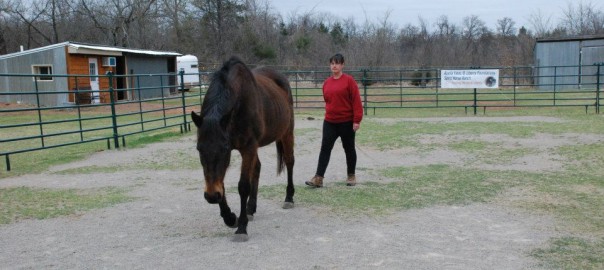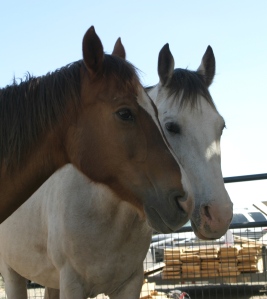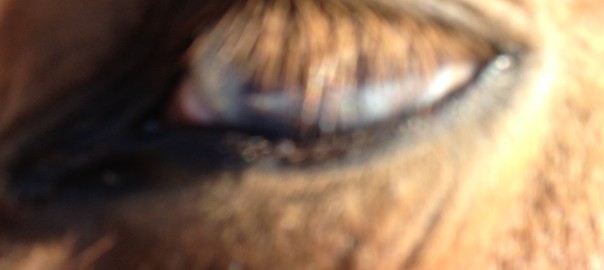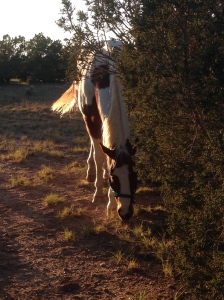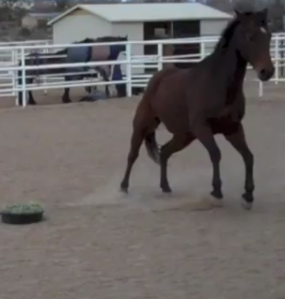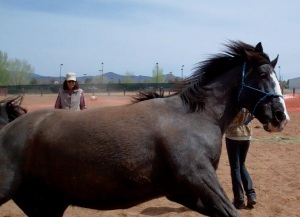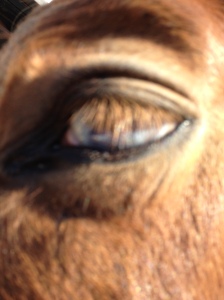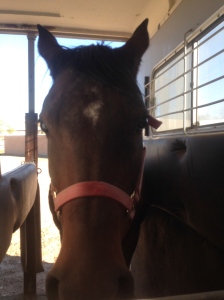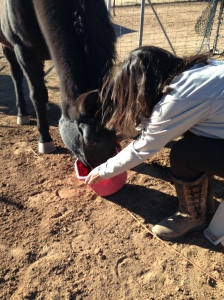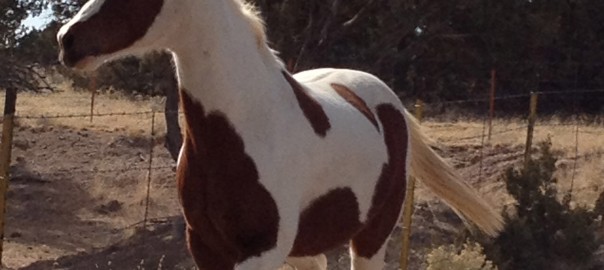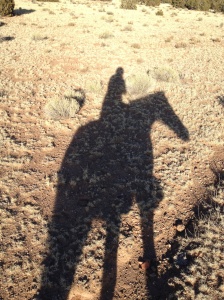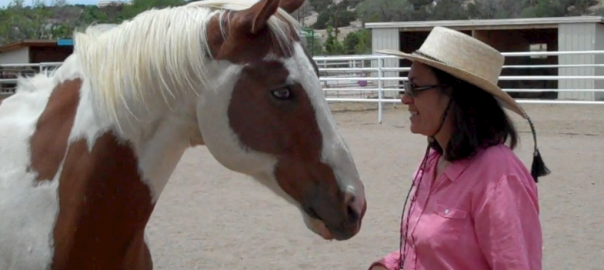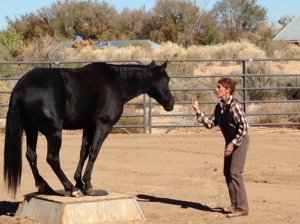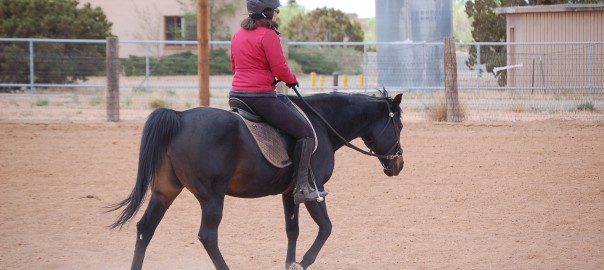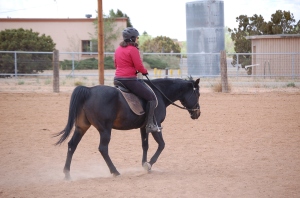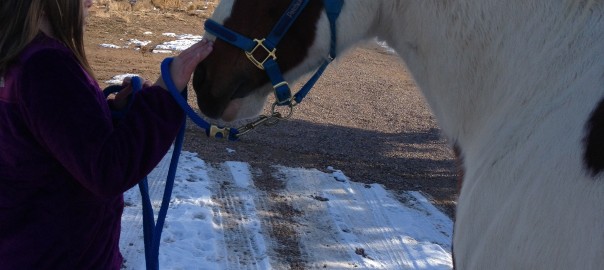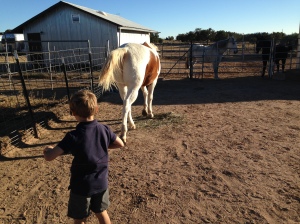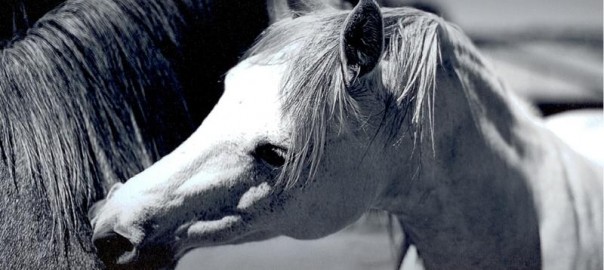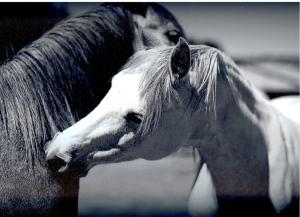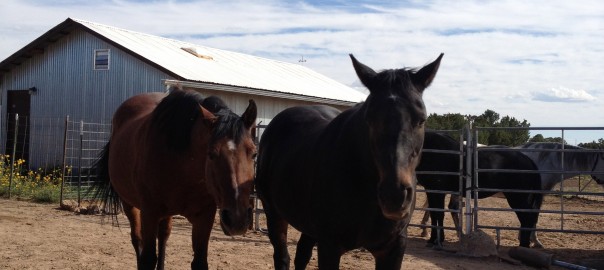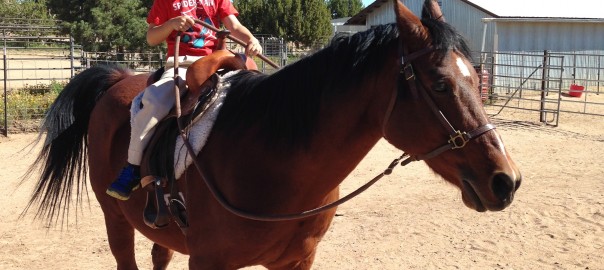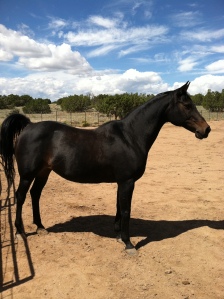One of the hardest things to do is to undo what we have known forever. What we have invested in as “the truth.” When you study with a particular trainer, you run the risk of becoming tunnel visioned, only seeing the way of that trainer, no one else, or no one else who might disagree with that trainer.
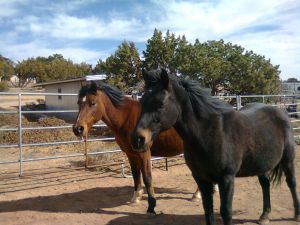
Since the world of horsemanship is somewhat dominated by “Natural Horsemanship” mentality, that is the acceptable way of doing things for many. It’s relatively easy to learn with all its steps – do this, then this, then this. For those people who are not intuitively driven, this is perfect. They can just follow a bunch of steps and come out the other end, hopefully intact.
The horsemen from whom this cookie cutter approach derived did not use a cookie cutter approach, and were
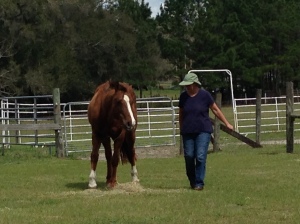
intuitive horsemen. They brought horsemanship out of the rough-and-ready stage into considering the horse, which was a huge step for mankind. This is not to be belittled in any way. Some of what I learned in this camp I still use today, but I am viewing it through a different lens, so I am doing things differently.
Horses do not operate in a series of steps. Where some of these step-by-step techniques may work well in a very wooden way, they are also being imposed on a horse rather than allowing the horse to make decisions for herself within the process. We want the horse to think about it, then see how it fits. Just like we would not enjoy having people impose their will on us, neither does the horse.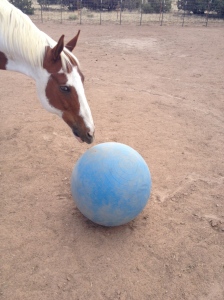
Certainly this step-driven form of horsemanship is very popular and horses do get trained that way. But look at their eyes. Look at how they feel being run around in a round pen, how they are so thankful to be let into the center of the pen. There is no escape, this is not liberty training, this is the predator pushing the prey animal out to the perimeter of a cage until he gets the desired result. The recognition of your leadership can be achieved in a more humane way, with more connection between the two of you, and not this “man over beast” mentality. Although 90% of horses can be trained successfully that way (and we’re not sure how ‘successful’ that training is), there is another 10% who are looking for something more, a deeper connection. Actually, the more I experience true liberty work, the more I believe the percentage of horses seeking this from humans is greater than these percentages show.
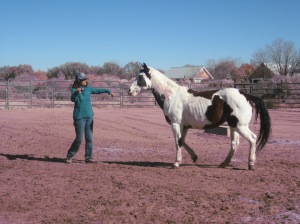
We have a greater population of unwanted horses than ever before, leading to more horses ending up in shelters and terrible circumstances. Those that find loving homes afterwards require a lot of special care, among these things are emotional support which the Liberty Foundations can give. There are also many more high performance horses who are being pushed beyond their mental capacity, due to high expectations of winning great sums of money and other ego-driven desires. These horses often have mental breakdowns and lose their interest in performing because it is fraught with expectation and cruelty in their minds. These are horses who will flourish with this gentle approach.
There are many other types of horses that will benefit, in fact, all horses will benefit greatly. I just listed some of the situations that create tension and stress for horses, where they cannot respond to the traditional types of training in many cases. Release to pressure is the last thing they need.
I think it’s also hard to undo this type of training because it comes with popular icons and popular sayings that people enjoy repeating. It also is difficult to undo because you have invested in the jacket, the saddle, the bridle, the t-shirt, whatever. You have bought the whole ball of wax: hook, line and sinker. The trouble with this is that every human makes mistakes. Every human who wants to find a better way does so their own way, but it isn’t necessarily your way. You might do better to explore who you are and what it is you want in a training perspective, what fits you, rather than taking the party line.
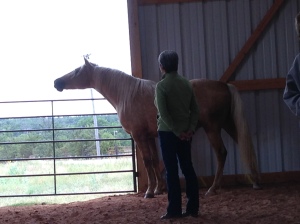
Personally I don’t want to study things that lock me into a particular perspective because my perspective needs to be free to grow and change with my knowledge. What I learned in teaching the last clinic is enormously helpful to my overall perspective: knowledge about what horses want, how to give them that, how people’s energy stands in their own way. The clinic is conducted by what the horse needs next, not by a series of steps. Of course, I had some knowledge before I went into it, but when I was there and feeling it all, new awareness filled me that I’m so grateful for.
We are not born knowing everything. When we cling to the knowledge we have invested in as if some one were trying to wrench life itself away from us, then we will have trouble learning new things. The new things I’m learning today are quite removed from what I learned three years ago, and I’m so grateful for that. I’m not doing things quite “the way I was taught.”
The best way to learn new things is to come to new studies with a “beginners’ mind.” Then everything is fresh and there is less desire to compare it to the old way. Perhaps you would have had a faster response from a horse if the horse was being trained in the round pen. You could go out and “break” ten colts a day, like in the old days. But is that necessary today? I don’t think that kind of economy exists in today’s world. Yet we continue to train horses this way.
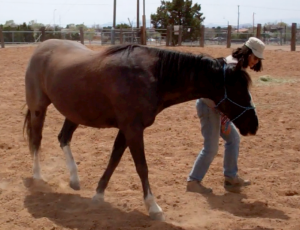 There is always something good to be taken from all we learn. It’s not necessary to throw the baby out with the bathwater, but instead be a discerning consumer of information. What does your horse look like when being round penned? Do you care or do you just want him to do what you want? Do you feel your relationship with that horse has grown stronger, or has he just succumbed to your wishes? Acquiescence isn’t the beginning of a relationship.
There is always something good to be taken from all we learn. It’s not necessary to throw the baby out with the bathwater, but instead be a discerning consumer of information. What does your horse look like when being round penned? Do you care or do you just want him to do what you want? Do you feel your relationship with that horse has grown stronger, or has he just succumbed to your wishes? Acquiescence isn’t the beginning of a relationship.
A lot of what we think is success with horses revolves around our own egos. In contrast, what we are doing with liberty training is working with the horse right where she is. We are not expecting anything. We are not involving our egos. The shift to this kind of thinking, or being, can be very difficult for some people. People are goal oriented. Not going in with some agenda can be upsetting for some. But the lack of agenda can really pay off in the long run, when the horse has had an opportunity to be known and paid attention to in a real way.
This new way of thinking or being is a paradigm shift. We are overcoming a lifetime of horsemanship, and in so doing, picking out the parts that resonate and still work, and being ready to discard what doesn’t fit. We are also artfully blending the whole of our knowledge into a fabric that will ultimately serve the horse and allow a door to relationship, which is where all of our unity with horses begins.
****
(copyright: Susan Smith, OrthoHorse)
Services: Bodywork (Ortho-Bionomy for people, Equine Ortho-Bionomy): private sessions, tutorials, phone consultations, distance healing communication and gift certificates
Liberty Coaching: clinics, mini-clinics, workshops, private and semi-private sessions, tutorials, consultations: by appointment: 505.501.2478 or emailing susansmith@orthohorse.info Spring Lessons – semi-private, private and small group sessions. Scheduling now. Contact me for details.
If you want to host a clinic in your area, contact me to make arrangements. Prices will vary according to location and travel. susansmith@orthohorse.info 505-501-2478
I conducted a free Liberty Coaching Call on March 12. If you did not have a chance to listen, here is the link: http://www.susith.com/orthohorse/freehorseatlibcall.mp3
On the schedule for 2014:
June 14th – Trail Riding Clinic
Where: Headquarters Well, Caja Del Rio, Santa Fe
Time: 9 a.m.-noon
Limited to 4 riders.
Cost: $75
Do you have questions or difficulties riding on the trail with your horse? What would you like to know to make your ride more enjoyable?
Trail riding is not just about “controlling” your horse, it is about establishing a “centaur relationship” that can carry you through all kinds of challenges.
Come learn from a seasoned endurance rider the following tips:
- Trail etiquette
- How to be safe
- How to get your horse ready for a trail ride
- What to bring with you
- Training
When we ask a horse to listen to us when we’re on a trail with other horses, we’re asking her to engage with us instead of with the other horses and the distractions that can occur on the trail. In this way, trail riding exposes what is not working in the arena and it exposes where your relationship with your horse needs strengthening. Find out some similarities between liberty training and trail riding.
In this clinic we will talk first about preparation and then work on some ways to manage situations on the trail, while in the saddle. We will take a short trail ride.
Bring:
• Snacks
• Water for you and your horse
• Hay if you want it
• Helmet
• Tack (saddle & some sort of horse headgear required)
This clinic is full but there is a waiting list. Please get on it! Contact me for enrollment & liability forms and Payment information. PayPal & checks accepted.
Combining cumulative knowledge from over 18 years of endurance riding, Liberty Horsemanship and Ortho-Bionomy bodywork practice, Susan Smith brings a unique perspective to getting a horse and rider ready for the trail – in mind, body and spirit.
Liberty Foundation work is destined to deepen your trail experience.
Contact Susan Smith@ susansmith@orthohorse.info or 505-501-2478.
September 27-28 – Spirit Horse Ranch Two-Day Liberty Foundations Clinic, Oklahoma City, Oklahoma – Engaging the Hearts and Minds of Horses. Susan Smith and Ruella Yates, co-teaching. Contact me or Ruella at 405-771-4274 (ruella@libertyfoundations.com)
*****




